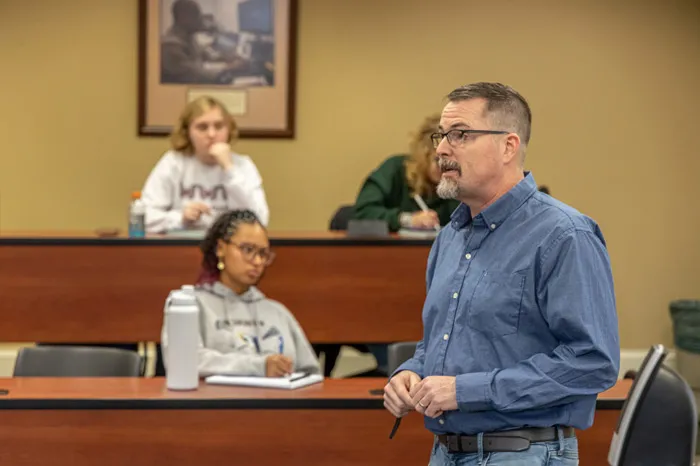
After bravely serving 20 years in the U.S. Air Force, Jason Nulton wanted to share his vast experience in the classroom.
He is in his sixth year of teaching and his first as the Community Engagement Coordinator at Marietta College, where Nulton teaches courses in Theories & Models of Leadership and Organizational Leadership. Now he is making a different, yet meaningful, connection with other veterans through a Marshall University — Testament program: Recovering Identity after War.
Instead of the classroom, Nulton is helping lead veteran discussion groups on weekends.
“We use ancient literature about wars, and the veterans learn they are not alone, and the impact of war on humans hasn’t changed much in 2,000 years,” Nulton says. “When they read a passage from Lucan’s Civil War about a soldier who fought in the conflict between Nero and Pompey, they learn that those soldiers were scared, watched their friends die, and the experience wasn’t much different than what modern vets have experienced more recently.”
The program is in its second year and was started by Marshall’s Dr. Robin Riner, Professor of Anthropology, and Dr. Christina Franzen, Professor of Classics.
“The veterans really connect with the texts,” Riner says. “It makes them realize their experiences are not unique to them. So, it makes them feel less alone.”
Riner is proud of what has been accomplished, and she and Franzen plan to maintain it if they continue to receive funding. She says “Testament” is designed to help veterans and their families feel comfortable discussing their trauma and recovery by reading and discussing past and reading old texts on war.
Riner has also noticed that group leaders like Nulton benefit from the program.
Nulton, a retired Lieutenant Colonel, agrees.
“It is therapeutic for me as well. It’s a well-done program,” he says. “When you come home from war, and you must cope with some of the aftermath, and that can be a very solitary feeling. … I never did any group therapy before, but getting into this group has been good. The No. 1 reason I think it works so well is we are putting veterans with veterans, and we understand each other’s language. There are some synergies there.”
Nulton completed nine active-duty assignments, held numerous leadership positions, and completed tours of duty on four continents. He served in deployed locations in the Balkans, Africa, the Persian Gulf, Levant, and Afghanistan and retired in July 2015 from the Pentagon.
“The discussion leaders want to give back and help other veterans,” Riner says. “That is something of the value they are getting out of it.”
In recent weeks, Nulton has engaged with as many as 10 veterans during a Saturday session in Huntington, West Virginia.
“There are three other veteran discussion leaders like me. One of them was in Afghanistan and Iraq, and the other two are Vietnam veterans,” Nulton says. “I must admit I was a little concerned at first asking war veterans to read texts that use such graphic language. But I have watched and learned that you gain some comfort in knowing that other people who had similar experiences hundreds and thousands of years ago have come and gone before you, and they survived.”
A native of Gaithersburg, Maryland, Nulton lives in Parkersburg, West Virginia. He is actively working to bring an ROTC program to Marietta’s campus and gain the Ohio Purple Star status for the College. The Purple Star Award recognizes schools that show a significant commitment to students and families connected to our nation’s military.
“I am focused on creating a chapter of the Student Veterans of America, which is something we must have before we can become an Ohio Purple Star campus,” Nulton says.